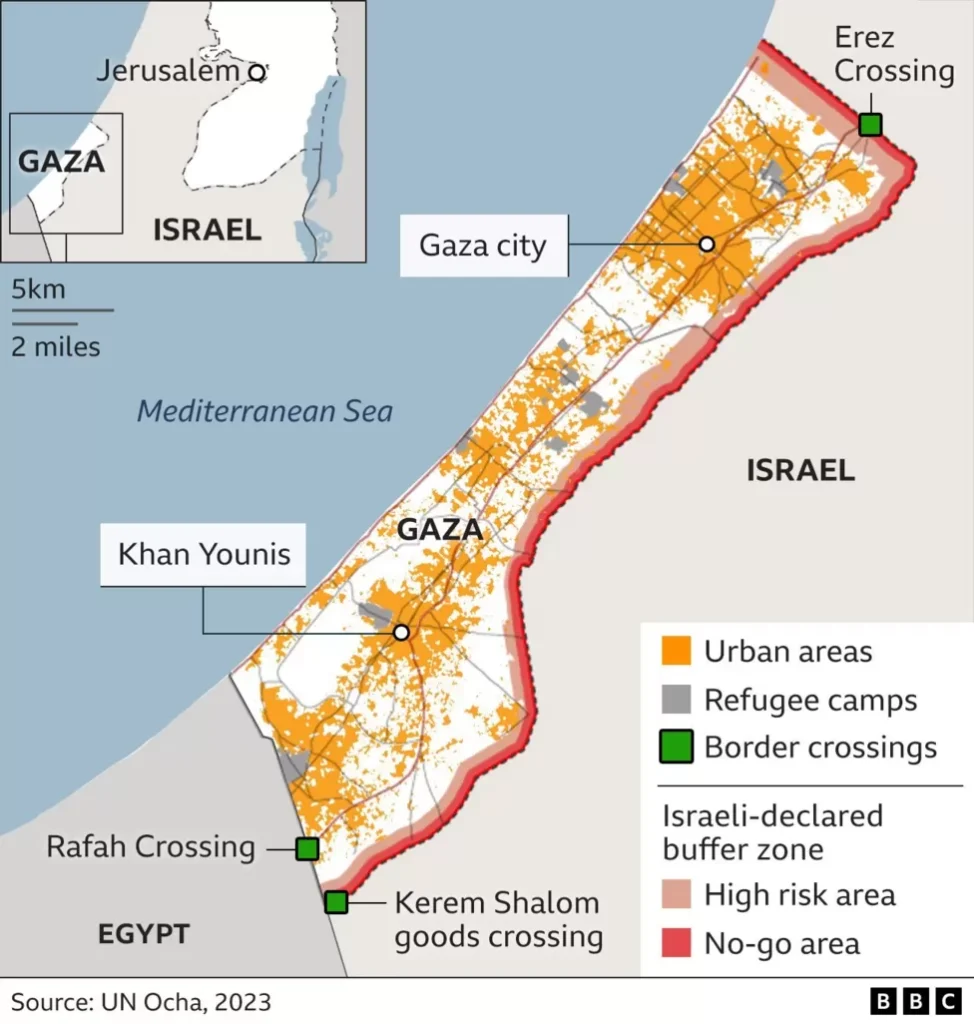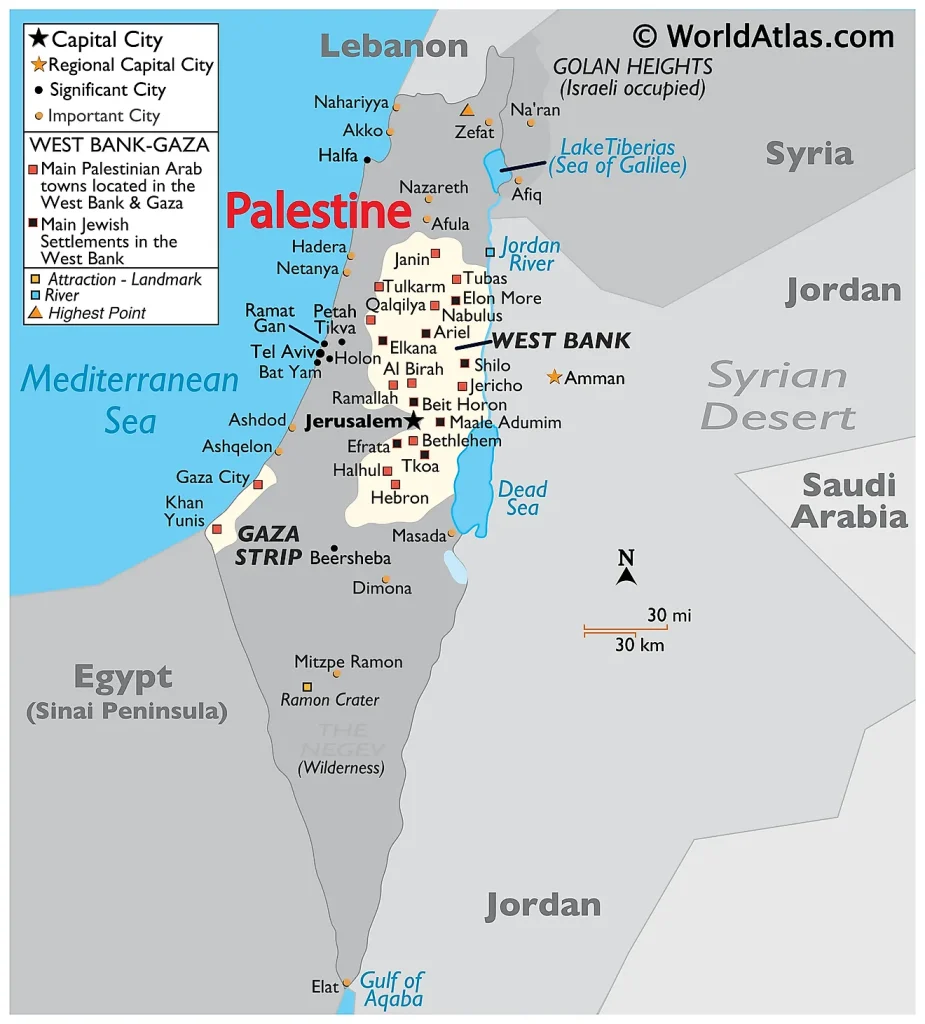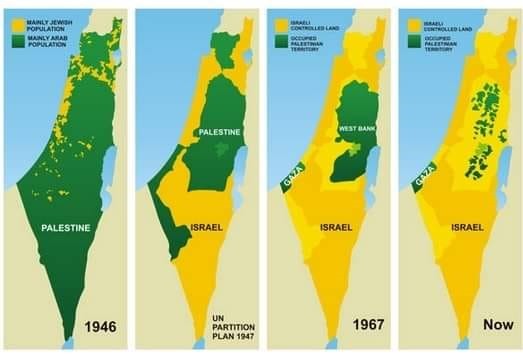I wrote this a few days after the brutal Hamas incursion into Israel. It’s extraordinary how things have changed in the global context. Assad has gone from Syria. Trump is in power in the USA and, being a brazen property developer, says he will “take over Gaza” and relocate Palestinians to do it, creating a multi-ethnic “Riviera” development. Between them, Israel and America should pay massive reparations for destroying Gaza, not profit from it.

On 7th October 2023 a complex, sophisticated, and multi-modal assault was launched on southern Israel by Hammas, a so-called Palestinian ‘militant’ organisation, from within Gaza. There have been minor exchanges of fire with Hezbollah in Lebanon, another so-called ‘militant’ organisation, in the north of Israel. It has, so far, resulted in thousands of deaths and injuries, in both Israel and Gaza, the kidnapping of Israeli men women and children as hostages, and the retaliatory arrest and incarceration without trial of thousands of Palestinians within Israel itself and the Israeli-occupied territories. It has led me to wonder what (and who) might be behind it?
Some of the Israeli civilian casualties, including women and children, were slaughtered, wholesale, in a bestial outpouring of hatred and anger, and rightly condemned around the world. As I write this, the Israeli military is pounding Gaza into rubble, also indiscriminately killing civilians, and in an extended act of revenge and reprisal Gaza has been effectively cut off from water, electricity, food and medical supplies. Though the United Nations Organisation, and other diplomatic channels, describe this as a war crime and a breach of international law, in general the world response to Israeli actions has, so far, been notably muted, even presented as Israel’s right to “self defence”. If evidence were required, though, of a beligerent attitude underlying the Israeli posture, a representative of the Israeli Defence Force (IDF) has been quoted as saying “”The IDF is capable of operating anywhere required and will strike any force that endangers Israelis. We will do this in any place (my italics) where it may be required.” We already know that forces from Israel have, for years, operated in Iran, Yemen, Syria, Jordan and so on, reaching out in pre-emptive acts of “self defence”.
There was surprise that the Israeli intelligence services, acknowledged to be amongst the most effective in the world, appeared to have been caught napping: they didn’t see it coming. Or did they? Reports emerged that Egyptian sources warned of an imminent attack three days before it started. Other reports, from Israeli reservists, warned of unusual military activity along the border for weeks before, reports that appear to have been ignored. An Israeli military spokesman referred to the shock as being like that in the US caused by 9/11 and Pearl Harbour, so it is ironic that similar reports sufaced of ‘ignored’ warnings after Pearl Harbour. Pearl Harbour brought the US into WW2, from sitting on the sidelines, and ultimately led to victory for the Allies. Some within Israel might have thought the price paid, as at Pearl Harbour, was worth the sacrifice made, by ignoring warnings. I have no doubt there are many in Israel who would dearly love to destroy the Palestinians as much as there are some Palestinians would like to destroy Israelis and the state of Israel. There can be no doubt that the Hamas attack on 7 October gave Israel a cast iron excuse to do just that. Did the hard-line, right wing, nationalist Israeli government secretly think that allowing the incursion that resulted in the deaths of 1200 citizens and abduction of 250 was a price worth paying? Whoever masterminded the attack, Hamas and their fellow travellers could not possibly have expected to destroy Israel by their actions on 7 October, but may have thought, strategically, the consequences of the inevitable Israeli reaction might ignite a regional reaction that would achive that for them.
It is a truism that nothing overcomes internal divisons quicker than an external threat and, until this latest conflict happened, Israel was deeply divided with unease, even in the military, of the direction of travel of the right wing coalition government. The Prime Minister, Benjamin Netanyahu, is under attack for pressing through reforms to the judiciary which are intended to limit the freedom of the courts. These reforms are so divisive within Israel, so anti-democratic, that some army reservists (on which the Israeli military depends) had threatened to not turn up if they are called. Mr Netanyahu is also under indictment for bribery, corruption and fraud, so this is a welcome distraction for him, but there are many, including at all levels of Israeli society, who are worried about the seemingly inexorable progress towards a theocracitic state: the conflation of Judaic law and civil law. An inevitable consequence of this is that criticism of the state of Israel, or the actions of its governments, is labelled as “anti-Semitic”. Whatever one thinks about the former leader of the UK Labour Party, Jeremy Corbyn, his inability to counter a label of being anti-semitic because of his overt support for the cause of Palestine, and his criticism of the state of Israel, cost him his job, cost Labour the next General Election and precipitated a change in Labour Party policy. All Jews, and even people with some Jewish heritage, know that anti-semitism, in thought and action, is real and ever-present, but today’s conflict seems to have precipitated an eruption of both in the UK. However, in the second world war, and ever since in the re-telling of its history, the same conflation of Germans and Germany with Nazis and Nazism took place – and continues to this day. We have seen what happens when the secular and democratic life of a nation is overtaken and suppressed by an ideology or theocracy: Afghanistan and Iran are two examples of the latter, with Saudi Arabia not far behind, and the active inclusion of the Russian Orthodox Church in Russian politics is yet another example.
Not all Israelis are Jews. Not all Israeli Jews are Zionists, not all Arabs are Muslims, not all Arab Muslims are fanatically anti-semitic or anti-Zionist. It is not beyond the bounds of possibilty that the forces from Gaza that inflicted such grievous and bestial harm are not even from Hammas’s own cadres, but from groups such as Isis/Islamic Jihad acting as proxies. At least 4 distinct groups (so-called Brigades) of fighters, representing different factions within Gaza, have been identified as having taken part. It is very muddy, too muddy for broad brushes. The term “Palestinians” is used as if they were a homogenous people from an identifiable land/country. They are not. They are a disparate multi-ethnic population, 75% of whom are regarded as refugees, and many of them are living in refugee “camps”. Not all so-called Palestinians support Hammas or Hezbollah, or indeed any of the many political or neo-political groups that seek to represent them such as The Palestine Liberation Organisation, Fatah, The Palestinian Authority and so on, but it suits some agendas, including those of a lazy and compliant world press, to lump everyone under one umbrella and paint them as “Good or Evil”. There is no room on the front pages of the tabloid press for nuanced reporting. The BBC, to its credit, published an early piece by veteran reporter John Simpson explaining why the BBC steadfastly refuses to label Hammas as “Terrorists”. Even long-term Middle East reporter Jeremy Bowen seemed to have been choosing his words very carefully and it took the BBC a week to start more in-depth objective and contextual analysis of the wider and historic causes of Middle East conflict. At first I only found a BBC Radio 4 production in the series “Briefing Room”, broadcast on 12th October, which was followed by a daily podcast, but the daily output on mainsteam TV (especially) was, in my opinion, ‘soft edged’.

Taking a step back, to allow a wider perspective, one wonders who, ultimately, will be the beneficiaries of a new Middle-East war? For example, in the global context, it undoubtedly suits Vladimir Putin to have the west’s attention taken away from Ukraine, it also suits him to have munitions earmarked for Ukraine, only a few days before reported to be scarce, to be diverted to support Israel. I would venture to speculate that this war also suits some other Middle-East nations. Assad’s Syria, for example, is a bedfellow of Russia and Putin and out of the rubble of their own civil war would like again to be a key player in the Middle East. Iran, for example, a rigidly theocratic state implacably opposed to the ‘West’ and the West’s client states like Israel, also has regional ambitions. There are increasing indications of what may be attempts by either “side” to provoke an extension of the conflict into Lebanon. Hezbollah, based there, is a massively well armed and well trained organisation: a wholly different order of opponent of Israel from Hammas. Since October 2023 Hezbollah has been firing a few rockets into northern Israel, allegedly in support of Hammas. Israel responds by firing artillery, some loaded with illegal white phosphorous, and mounted air strikes into Lebanon in response. Israel has claimed their forces have intercepted (i.e. shot down) drones flying from their territory, including from Yemen. There is also a largely unreported conflict on the so-called West Bank, where heavily armed illegal Israeli settlers, with the tacit (or actual) encouragement of the Israeli government, are intensifying ongoing raids into Palestinian/Arab lands and forcibly evicting the legal residents. It all feels, to me, like a deliberate series of provocations intended to justify a wider war – and I wonder, to whose agenda?
I would argue, it is not completely ridiculous to ask whether the backers of both main actors in this war, Israel and “the Palestinians”, are being manipulated by others to create a situation that results in changes to the intractable conflict, for their own regional ambitions, and this is why the international response has been muted. While people on all sides are dying, apart from some appeals for restraint, the major governments are waiting to see how this plays to their overall strategy for the region. When considering such an apparently ludicrous and machiavelian idea it is helpful to review how, and why, it got this way.
The creation of the state of Israel, a homeland for Jews, in the guilt-ridden aftermath of the second world war was (I contend) at best badly mishandled, at worst a mistake. The 1917 Balfour Declaration led to the creation of a national homeland for Jews, and this Wikipedia article bears some study. https://en.wikipedia.org/wiki/Balfour_Declaration. Critically it did not propose that a state of Israel would be established in all of the territory then known as Palestine, and it specifically said that the rights of the Palestinians, who then represented the vast majority of the population there, should be protected. Understandable in the recognition of the Nazi Holocaust (whose ghost has been raised by the present Israeli government), and the historic and historical oppression of Jews everywhere, the way in which it then happened by the forced appropriation of lands belonging to Palestinian Arabs planted the seeds of the present atrocities. Britain’s mandated control of Palestine was wrested from it by armed struggle with who we would now call Israelis but, at the time, we called terrorists: Irgun and, often known pejoratively as the Stern Gang, “Lehi”. Lehi was a Zionist paramilitary militant organization. Large swathes of what we now call the Middle East was colonised, mainly by Great Britain, France, Germany and Turkey, the major protagonists in the First World War, and the ‘redistribution’ of colonial ‘spoils’ after that war set the stage for what we now see. See this link for some more information: https://www.nam.ac.uk/explore/conflict-Palestine

There are elements within the Israeli establishment, and having influence over the establishment, that I believe would like to ethnically “cleanse”, and militarily sanitise, Gaza of Arabs: to replace the population with Israelis. Not many will say so openly, but for some Israelis the ideal solution would be to push the Gazan Palestinians into the sea, or over the border into Egypt. I would go further and say Gaza bears ironic and ugly comparison with the Jewish ghettos of eastern europe, and the inevitable consequences of that in the so-called holocaust. Gaza has become a kind of concentration camp, and the suggested forced ‘evacuation’ of the populace for their own safety, is just another kind of Pogrom which should resonate with some Israeli Jews. The modern political and military rationale is that Gaza is an open sore threatening Israel. The political and economic rationale is that Israeli occupation and control of Gaza gives Israel uninterupted access to the Mediterranean from the border with Egypt in the south to Lebanon in the north.
And if Israel did achieve a completely unified border, and contiguous land mass, what then? Would its historical, almost genetic, insecurity be assuaged? What, for example, of it’s borders with Lebanon, Jordan and Syria, which have already been ‘adjusted’ by occupation of the Jordanian ‘West Bank’ and the Syrian Golan Heights? With both sides seemingly held hostage by extremists, and with a Russian backed Assad in charge of Syria, what new flash points might there be? What of the land annexed by armed Israeli settlements, what of Jerusalem? Are these not just future Gazas which, in time, Israel would claim need to be ‘dealt with’ in the name of “self defence” and its national security?
With the increasing likelihood of a right-wing Republican government, and President, in the United States, one historically inward looking, will Israel be hoping for a ‘free hand’ over the next 4 or even 8 years? Will the election of an, apparently, more moderate leader in Iran impact on Hezbollah? We shall see.
